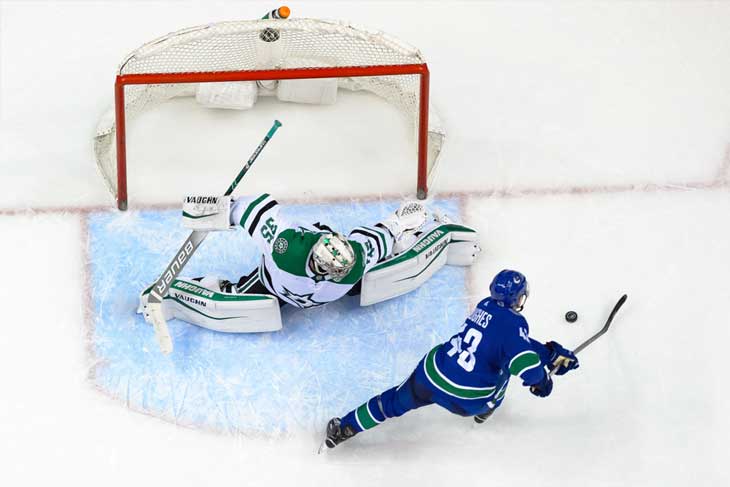2018-19 Season Review: Vancouver Canucks
Rebuilds don’t materialize overnight. They require patience, the stomach to endure a pile of losses and some luck at the draft. So far, so good for the Vancouver Canucks. Despite never picking higher than fifth overall in the past five years, they’ve produced a Calder Trophy winner (Elias Pettersson), a finalist (Brock Boeser) and a defensive prospect (Quinn Hughes) who’s the altered the entire complexion of their blue line.
After a few lean years, Vancouver can finally see light at the end of the tunnel.
Of course, that promising long-term outlook didn’t save the Canucks from a rough season in 2018-19. It started out really well, though, as the team rode Pettersson’s astounding start to a 10-6-1 streak (3rd). The 20-year-old racked up 17 points in his first 11 NHL games and looked every part of a budding superstar. His vision and offensive instincts popped off the screen and perfectly complemented Boeser’s clinical finishing ability. Unfortunately, injuries to both star forwards slowed down their production and exposed an otherwise impotent squad. Over the remainder of the season, Vancouver’s offense sunk from 3.29 to 2.51 goals per game. There was no longer any hiding the team’s three-zone deficiencies.
The Canucks controlled 47.9% of the shot attempts (25th), 45.0% of the scoring chances (31st) and 45.6% of the high-danger opportunities (27th) for a 45.3% goal share (27th) at 5-on-5. Their on-ice save percentage ranked 22nd and they finished 18th in goals allowed, so it’s not like their defense or goaltending could help them overcome their issues either. Unsurprisingly, they closed out the year with a 25-30-10 record (28th) that stopped them nine points short of the playoffs.
With that said, there were certainly silver linings worth noting as the team looks to the future. Obviously, Pettersson (66 points in 71 games) was a revelation as a dual threat. He’s an outstanding passer, but his deadly release yielded 28 goals in his rookie year as well. Moreover, he thrives at the quicker pace of the modern NHL, constantly unlocking defenses with his smarts and elusiveness in space. Meanwhile, Boeser (56 points in 69 games) remained dangerous in his second full campaign. Though the 22-year-old isn’t as consistent as some would prefer, opponents must respect his blistering shot. He ranks 18th in even-strength scoring rate over the past two seasons.
Bo Horvat (61 points in 82 games) also maintained his steady progression on the second line. Even with tough matchups and a revolving door of subpar linemates, his points-per-game mark has improved in four consecutive seasons. The 24-year-old has become a dramatically better skater since his draft year, he’s strong as an ox, defensively responsible and already becoming a leader on this team. Better yet, the Canucks may have found a good complementary linemate for him in Tanner Pearson. Prior to his arrival in Vancouver, the well-rounded winger was suffering through his worst pro campaign split between Los Angeles (1 point in 17 games) and Pittsburgh (14 points in 44 games). General manager Jim Benning acquired Pearson for bottom-pairing blueliner Erik Gudbranson and he struck instant chemistry with Horvat, registering 12 points in 19 games and combining for a 50.8 HDCF% and 63.6 GF%.
On the back end, veteran Alex Edler (34 points in 56 games) put forth his strongest offensive year in ages. The addition of Pettersson appeared to rejuvenate the fellow Swede, who pressed the issue more often than he had in quite some time. Late in 2018-19, Hughes (3 points in 5 games) joined the club and offered a brief if electrifying glimpse of what’s to come. In five contests, the undersized 19-year-old moved the puck with a level of confidence Vancouver wasn’t accustomed to. He actively sought to jump into the play and break down opposing defenses rather than standing idle at the point. His assertiveness and creativity tilted the ice for his club, as the team put up a 53.1 CF%, 50.7 SCF% and 54.2 HDCF% during his shifts.
Beyond those bright spots, however, there were mostly disappointments.
The club was stuck with Loui Eriksson’s (29 points in 81 games) terrible contract, Chris Tanev’s trade value maintained its downward trajectory, Vancouver was still waiting on youngsters Jake Virtanen (25 points in 70 games) and Nikolay Goldobin (27 points in 63 games) to make a serious impact and its lack of depth forced Markus Granlund (22 points in 77 games) and Tyler Motte (16 points in 74 games) into the lineup.
Between the pipes, Jacob Markstrom (2.77 GAA, 91.2 SV%) has yet to provide the Canucks with a clear indication of what they have in him. Once the most hyped goaltending prospect in the world, the 29-year-old alternates between superb and mediocre performances. He’s a 6’6” monster with great reflexes, but his penchant for allowing weak goals is difficult to ignore. 23-year-old Thatcher Demko (2.81 GAA, 91.3 SV%), who is held in similarly high regard, performed as well as Markstrom did in limited appearances and could be Vancouver’s man as soon as next season.
Benning has ensured that optimism surrounding the team extends far beyond last year’s roster too.
On draft night, he sent a conditional first-rounder, a third-rounder and depth netminder Marek Mazanec to the cap-strapped Tampa Bay Lightning for forward J.T. Miller (47 points in 75 games). The versatile 26-year-old was no stranger to Tampa Bay’s top guns, so head coach Travis Green now has a nice supporting piece he can plug alongside his most talented names.
In free agency, Vancouver added power forward Micheal Ferland (40 points in 71 games) at a below-market $3.5 million cap hit. The 27-year-old loves to throw the body and also has experience suiting up in the top six, as he enjoyed quality minutes on Carolina and Calgary’s first lines over the past couple of years. Granted, his health is a concern. Assuming he can stay on the ice, however, he’s proven that he can hang with high-end talent and is precisely the sort of agitator that opponents hate to play against. Vancouver also signed Tyler Myers (31 points in 80 games) and Jordie Benn (22 points in 81 games) to shore up a leaky defense. Myers is prone to the occasional gaffe but compensates for that with remarkable physical gifts. He skates well by the average player’s standards…but he’s no average NHLer: He stands at 6’8”, 229 pounds. That reach will surely come in handy. Meanwhile, Benn is a no-nonsense 32-year-old who just enjoyed the finest year of his career. He’s physical, seasoned and an ideal fit for an up-and-coming club.
Conversely, there weren’t any painful departures. Free agents Granlund (Edmonton), Ben Hutton (L.A.), Derrick Pouliot (St. Louis) and Luke Schenn (Tampa Bay) were serviceable at best and have been replaced by superior players.
The cherry on top arrived on draft night when Vasily Podkolzin dropped to the Canucks at 10th overall after projections had him in the first five picks for much of the campaign. Though the 18-year-old winger will play in Russia this year, he brings a hard-charging, powerful dimension that Vancouver lacks up front. Podkolzin joins a decent pipeline that includes Olli Juolevi (2016 5th overall pick), Jett Woo (2018 37th overall pick), Tyler Madden (2018 68th overall pick), Michael Dipietro (2017 64th overall pick) and Nils Hoglander (2019 40th overall pick).
The one major question mark leading into 2019-20 is head coach Travis Green. He hasn’t had the horses to truly compete in his two years behind the bench and it’s thus unclear whether he’s a good enough tactician and motivator to push his team to the next level. The roster is definitely trending up, though. Entering his second pro campaign, Pettersson should be more physically prepared for the rigors of an NHL season. Boeser and Horvat are terrific young players with untapped potential. Hughes looks poised to make a statement on the blue line. With Benning’s additions of Miller, Ferland, Myers and Benn to a group that features Edler, Tanev, Antoine Roussel and Jay Beagle, there’s a stellar mix of veterans on hand as well.
If Green is the right man for the job, the playoffs could be much closer than they appear.
Recent Posts

How Corey Perry Is Making His Presence Felt With the Lightning
View Post »
How Adam Fox Pushed the Rangers Past the Penguins
View Post »

